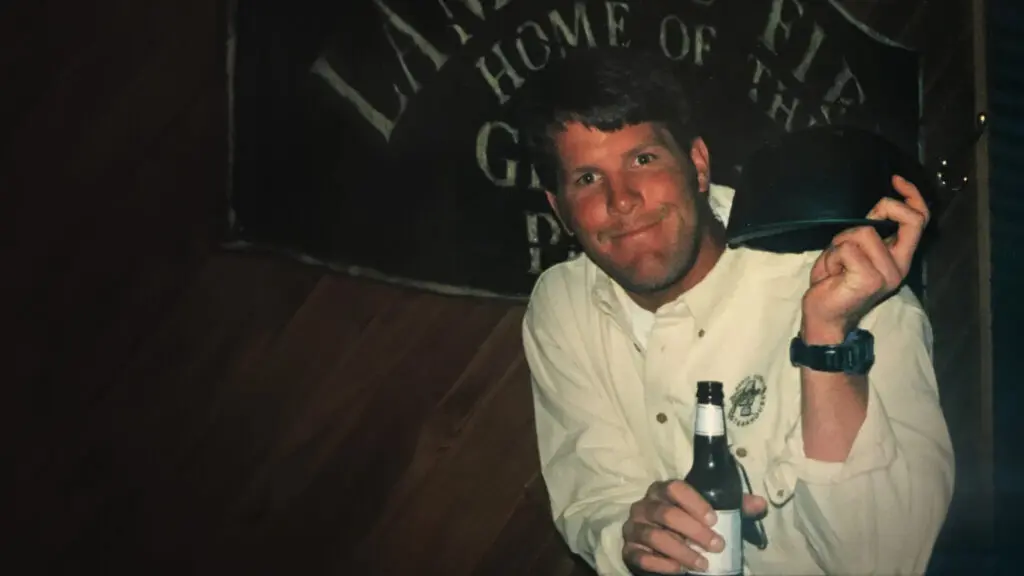
Well, we’d better be careful with this one, folks. You can say a lot about Brett Favre, but at least you can’t accuse him of being stupider than the Liver King, who was silly enough to be extensively interviewed in a documentary that was clearly making fun of him. Favre deliberately steered clear of Rebecca Gitlitz’s Untold: The Fall of Favre. With proceedings still on-going, criminal charges never having been filed, and Favre himself denying any wrongdoing and being famously litigious against those who claim otherwise, let’s just take it as a given that the word “allegedly” precedes every mention of Favre’s myriad accusations of personal conduct violations and welfare misspending scandals.
Favre’s absence from this documentary – even Gilbert Arenas and Javaris Crittenton showed up for Shooting Guards – gives it an interesting feel. It isn’t from the horse’s mouth, so it is exclusively condemnatory, but to be fair, it doesn’t seem like there’s a particularly balanced perspective to be had here. The story of Brett Favre is bigger than Brett Favre; it’s a story of idol worship, power, privilege, and how the right kind of person in the right kind of circumstances can become essentially untouchable.
It’s easy to interpret “the right kind of person” as “a white dude”, and there’s some truth to that here, but in Favre’s case, there’s a little more to it. The early portions of the documentary lay out the crucial context for how and why Favre became utterly beloved as an NFL icon, and it wasn’t just that he was almost preternaturally gifted at throwing a football. He arrived at the Green Bay Packers, a team intimately tied to Wisconsin’s very identity, during a long drought in success terms, and he was considered almost single-handedly responsible for the team’s subsequent winning seasons.

There’s an elite status that a white dude can occupy when they’re beloved of an entire state, if not a whole nation. And this became obvious as Favre became increasingly famous and powerful, especially following the death of his stern disciplinarian father, Irvin, from a heart attack. Favre went off the rails after that, his public-facing image as a quintessential Minnesotan family man seemingly indestructible, even with his partying and infidelity something of an open secret.
The professional and personal downfall followed Favre from the Packers to the New York Jets, which is where he came into very loose contact with ex-Gameday host Jenn Sterger, whose story parallels Brett’s own throughout Untold: The Fall of Favre. Sterger’s rise to fame hadn’t been quite as meteoric, but had a certain virality that carried her from a provocatively dressed fan to a model to a well-known media personality. Favre immediately took an interest, sending Sterger messages, voicemails, and eventually lewd photos after being given her number by an employee.
The misogynistic whirlwind that followed ruined the career of Sterger – who looked uncannily like Favre’s wife – but left Favre himself untouched. A move to the Minnesota Vikings, direct rivals of the Packers, caused some controversy but didn’t strip Favre of legend status. When Jenn’s tell-all story was cruelly run without her consent by Deadspin editor A.J. Daulerio, she was pilloried in the media while Favre, albeit criticised, was nonetheless left to pursue his post-career business endeavours.
Those endeavours, ostensibly charitable, led to the currently ongoing scandal about allegedly misallocating welfare funds into pet projects like a volleyball stadium for his daughter and a very sketchy anti-concussion company he was personally involved with. If nothing else, there might be some mileage in the concussion angle. Towards the end of the movie, we see Favre revealing before a congressional committee in 2024 that he has been diagnosed with Parkinson’s disease. He still insists that his good name has been smeared. He seems to be doing all right to me.


